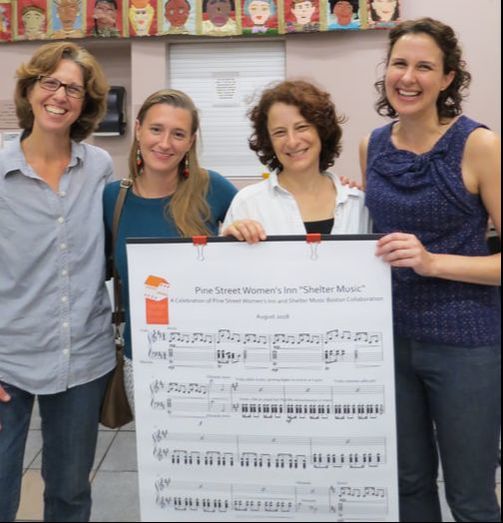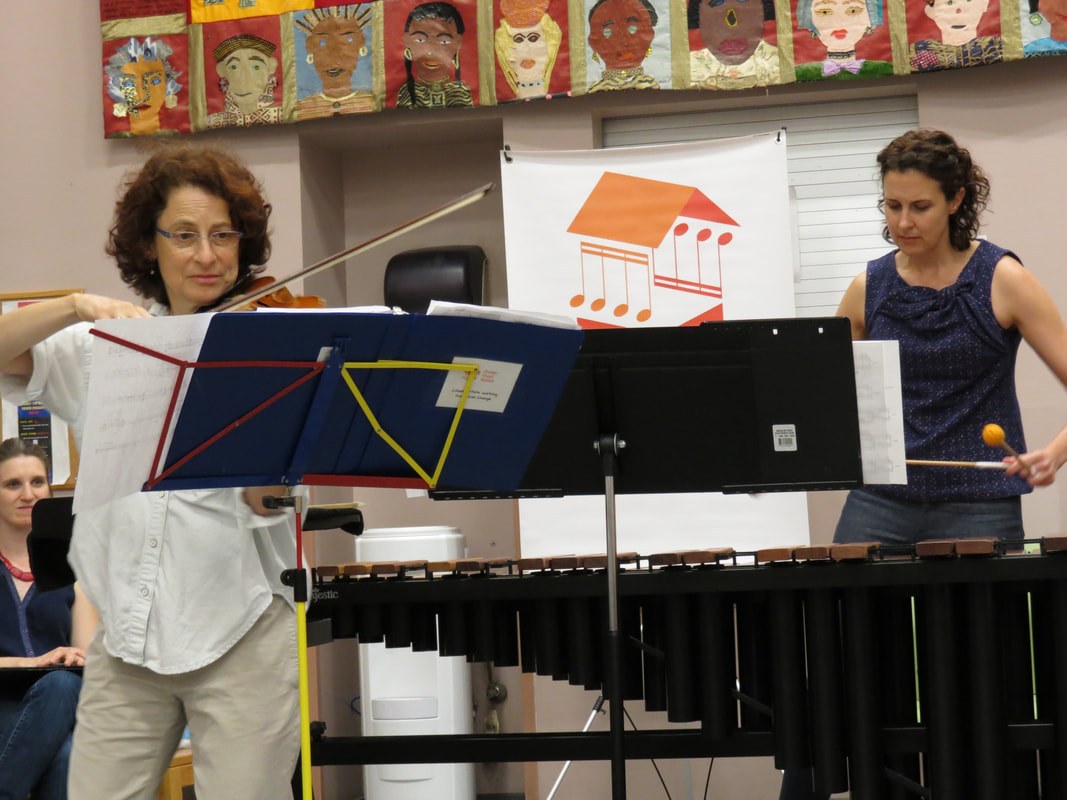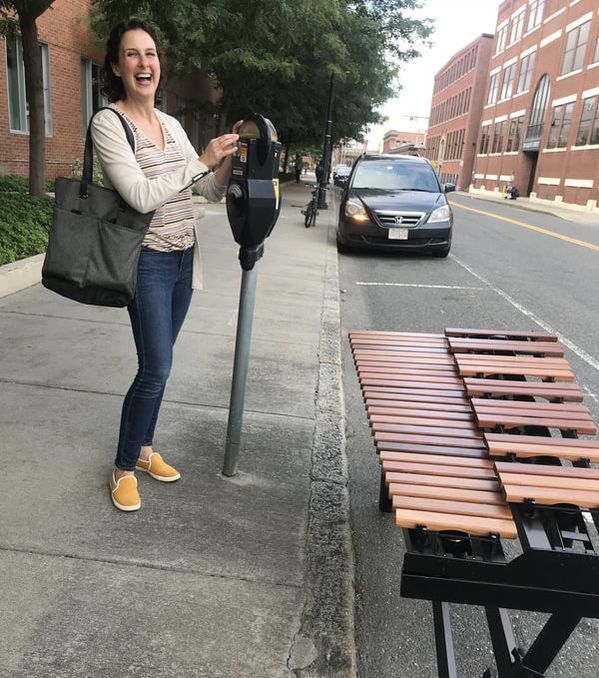 From left -- violist Rebecca Strauss, composer Danielle Williams, violinist Julie Leven, and myself. We presented each shelter with a score of their composition.
From left -- violist Rebecca Strauss, composer Danielle Williams, violinist Julie Leven, and myself. We presented each shelter with a score of their composition. Last year I wrote about the composition workshops that Shelter Music Boston brought into homeless shelters. Each shelter created a wealth of musical ideas, and we gathered those ideas -- as well as beautiful poems and comments from the guests -- and sent them to composers to commission chamber works.
This year we returned to the shelters to perform these works, now grouped into a suite called “Water For My Soul.”
When I started preparing the music, I immediately started smiling. Danielle Williams composed “Shells From the Sea” for baritone voice, viola, marimba, and cello. The first melody, sung stunningly by baritone RaShaun Campbell, was the melody the women at the Dimock Center had composed with violist Rebecca Strauss and me last June. More importantly, I remembered they loved their melody so much they all left singing it together.
Later in her piece, Danielle wrote a little fugue between myself, the viola, and the cello (played beautifully by Javier Caballero). In that fugue was a melody we had begun writing with a shelter in Lowell and had presented down to the Pine Street Women’s Inn to complete. When we played the first part of the melody, a woman at Pine Street immediately started singing a second part to the melody, essentially finishing its sentence. To hear that melody finalized as a fugue was the perfect treatment to a melodic line composed across the city by different shelter guests!
This year we returned to the shelters to perform these works, now grouped into a suite called “Water For My Soul.”
When I started preparing the music, I immediately started smiling. Danielle Williams composed “Shells From the Sea” for baritone voice, viola, marimba, and cello. The first melody, sung stunningly by baritone RaShaun Campbell, was the melody the women at the Dimock Center had composed with violist Rebecca Strauss and me last June. More importantly, I remembered they loved their melody so much they all left singing it together.
Later in her piece, Danielle wrote a little fugue between myself, the viola, and the cello (played beautifully by Javier Caballero). In that fugue was a melody we had begun writing with a shelter in Lowell and had presented down to the Pine Street Women’s Inn to complete. When we played the first part of the melody, a woman at Pine Street immediately started singing a second part to the melody, essentially finishing its sentence. To hear that melody finalized as a fugue was the perfect treatment to a melodic line composed across the city by different shelter guests!
 Julie and I play Francine Trester's "In Our Own Words."
Julie and I play Francine Trester's "In Our Own Words." Another piece, “In Our Own Words,” by Francine Trester had an interactive element with the audience. Each of her five movements was inspired by an audience member’s written comment about one of our past shows. We would ask a member of the current audience to read one of these comments (an example: “Music was water for my soul when it was thirsty.”). Immediately after, one of our singers would sing a setting of the text, and then Julie Leven and I would play a marimba-and-violin duo that further brought the comment to life. It was so neat to see and hear spoken words transform into singing, and singing transform into instrumental music.
 Parking is hard in Boston, especially for marimbas.
Parking is hard in Boston, especially for marimbas. This year we expanded to play eight different concerts across the city. As a marimba player, it means I’m constantly loading in and out of Boston’s busy downtown streets and hauling my rig up steps and easing through small doorways of its old buildings. At each place I would be greeted by people staying at the shelter asking me if I needed help. At one location, two young men had to lift my marimba over their heads to get it up a tight stairwell. Musicians -- myself included -- are notoriously protective of their instruments, but for these concerts I am always happy to accept the help. It teaches me, time and time again, that people offer thanks to each other in all kinds of ways.
At each concert we took time at the beginning to explain that the words and music was sourced directly from the homeless community. And at each concert I would watch as people’s eyes caught this fire as they heard the words and music played back to them -- it was their voices brought to life, empowered, and amplified.
It's hard to express the overwhelming gratitude you feel when you perform for people who truly give you their full attention -- our audience listens so closely that they write us reflective poems after we finish, or say comments like, "That was the first time I was able to sit with myself in four years!" It was a joy this year, after being heard so closely concert after concert, to play works inspired by this amazing audience. It felt like I was able to say back to them: I hear you, too.
At each concert we took time at the beginning to explain that the words and music was sourced directly from the homeless community. And at each concert I would watch as people’s eyes caught this fire as they heard the words and music played back to them -- it was their voices brought to life, empowered, and amplified.
It's hard to express the overwhelming gratitude you feel when you perform for people who truly give you their full attention -- our audience listens so closely that they write us reflective poems after we finish, or say comments like, "That was the first time I was able to sit with myself in four years!" It was a joy this year, after being heard so closely concert after concert, to play works inspired by this amazing audience. It felt like I was able to say back to them: I hear you, too.